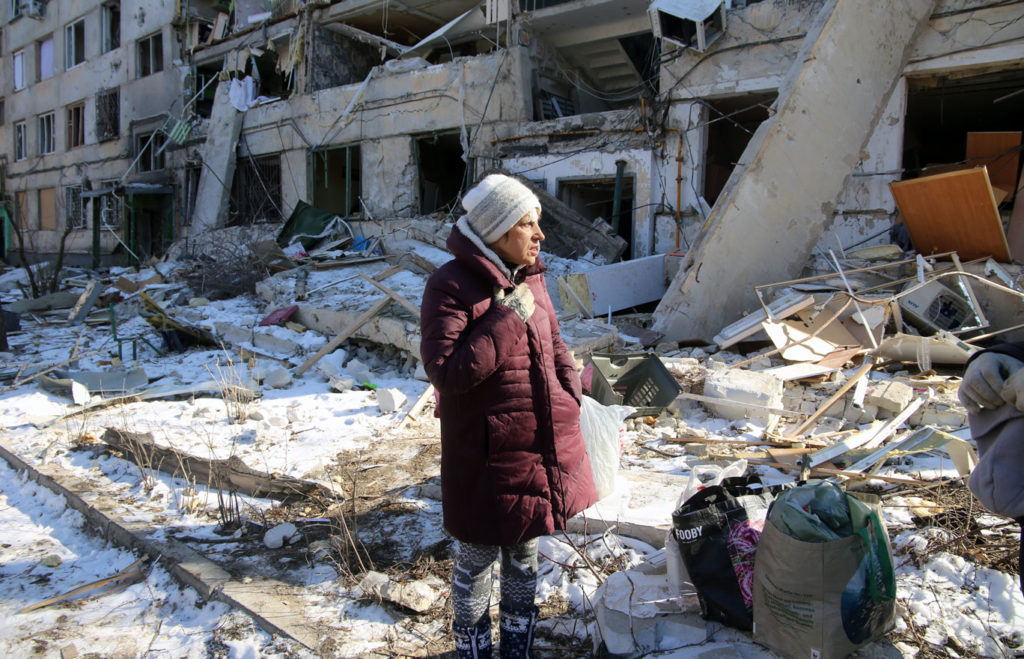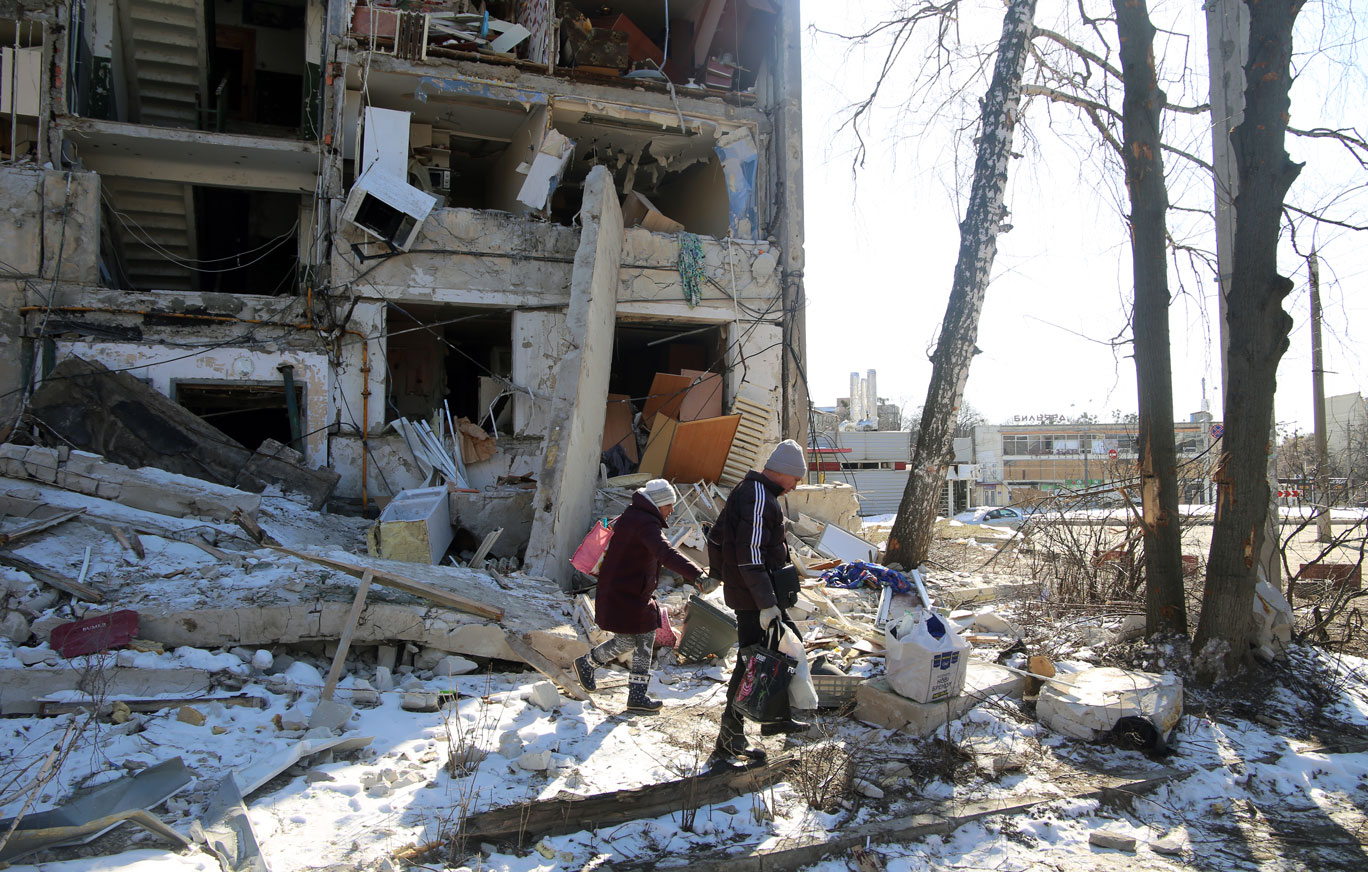“Russian terrorists did this. … And my father is Russian, from Belgorod!” Galina, a 63-year-old cashier, says as she pulls her belongings from the wreckage of what used to be her apartment. As she gestures at the rubble behind her, she tells us, “They dumped an enormous bomb from a plane over there, at what used to be our flat.” Galina and her husband, Sergey, also 63, have not left the city because they have nowhere to go. “Anyway, [President Vladimir] Putin’s tentacles are reaching everywhere, even to Lviv,” she says, referring to an airstrike on a volunteer base that killed dozens of soldiers several days ago across the country in western Ukraine. “He has to be stopped. He has to be killed ― that is the only way.”
The foundations of half-a-dozen apartments remain, but the front walls have been blown off and most people’s possessions lie on the ground among the smashed stones. It is here that Galina and Sergey rummage through the wreckage trying to salvage what they can. The husks of two cars, now just piles of twisted black metal, lie on the street outside.
Despite the carnage that has been inflicted on the people of Kharkiv, they say that their relatives in Russia refuse to believe that anything untoward has happened to them. The irony, Galina says, is that “Kharkiv is — or at least was ― a pro-Russian city! Everyone here speaks Russian and has family over the border.” But now sympathies for Russia have evaporated, replaced with burning hatred. Perhaps unexpectedly, it is here in the Russian-speaking east that you hear the most passionate denunciations of Putin and the Russian attack on Ukraine.
Previously, western Ukraine, with its closer links to central European countries like Poland and Slovakia, where Ukrainian is the dominant language, was the most fiercely anti-Russian part of the country. Yet you could still find people here who would say that they do not blame ordinary Russians for the actions of their government and lay the blame for the war on Putin. You do not hear this anywhere now in the east.
Animosity toward Russia has sharpened among people in the east for two main reasons. First, eastern Ukraine has borne the brunt of the indiscriminate destruction that Putin has unleashed. Kharkiv and Mariupol have suffered brutal and cruel bombardments. The second factor is proximity to Russia — and not just in geographical and cultural terms. For many, this feels like a deep family betrayal, as if it is their siblings and cousins firing the shots. In some cases, it is.
“If you call to Moscow — our friends have relatives there — they don’t believe any of it. A sister was looking at her brother in the hospital over video. Her brother had been wounded, and she would not believe him. She said, ‘You did this to yourself; you are fighting a war among yourselves.’ ”
The other excuse they use is: “ ‘It was the neo-Nazis who did this. Russians are here to liberate you from them,’ ” Galina fumes. “Well, all they’ve done so far is liberate us from our apartments!”

As we walked past a university building in central Kharkiv that had been blown to pieces by a GRAD rocket barrage, a local woman stopped me and pointed to the mess saying, “This was all built by imperial Russia! It’s Russian bombing Russian.”
The Russians have claimed to be striking only military targets. But in our time in Kharkiv, we saw every type of building imaginable in ruins: primary schools, apartment blocks, university residences, hospitals. It seemed that every street we drove down had more damage than the last. The destruction in the center is orders of magnitude higher than that in Kyiv.
Alexei, a 45-year-old retired police commander, was in bed when a rocket struck his apartment block three days ago. The strike came at daybreak, blowing off his unit’s windows and doors. His wife was severely injured and is currently recovering in the hospital, while his infant son suffered light injuries. Alexei showed me a phone video he took shortly after the raid in which he holds his crying son, covered in blood. The air raid siren is ringing in the background.
The locals say that the Russians will often wait until shortly after the morning curfew ends at 6, when everyone goes to line up at supermarkets for supplies. Then, they will unleash their artillery in an attempt to scare the civilian population into submission.
For all the destruction, the mood among Kharkiv residents is surprisingly upbeat. “The first week was awful,” Deva, our driver, says. “Now we are just used to it; this is our lives. If we go more than two days without a big explosion, we think, ‘That is strange, what is going wrong?!’”
When we visited an underground bar that has been transformed into a volunteer center that prepares meals and medicines for soldiers, everyone was smiling and laughing, offering us food and coffee while watching a Premier League football match — Arsenal vs. Aston Villa — on a flatscreen TV. The major adaptation to their lives, they say, comes from sleeping in their tattoo parlor, located underground.
The atmosphere at other volunteer centers, such as those in Odesa and Dnipro, are much more tense, with people constantly asking for our documents and expressing their concern that they could be targeted by rockets. Karkhivites assume that they have seen the worst already. If Putin has not been able to make inroads into the city after a month, there is little reason to expect he will do better soon, they say.
Still the anxiety is palpable. While walking midafternoon with our Ukrainian colleagues, my team and I were accosted by a police officer whose breath stunk of alcohol. He confiscated my phone and camera, and as he pointed his gun at my head, he screamed: “Why do you need to do interviews?! Why do you need to take photos?!” When we explained we were journalists, he did not understand the concept. Thankfully, his colleagues quickly calmed him down and gave me back my possessions.
Many Ukrainians now think that the carnage is not just the result of one group or Russian citizens but that it stems from a deep-rooted way of thinking based on a rosy interpretation of Russian history.
Roksolana Olyarchuk, a 31-year-old from Ternopil who works for the Ukraine Institute promoting national culture abroad, said, “After this, Russia needs to go through a reeducation process. The idea of the Russian imperium, that every child in school is brought up with, needs to be torn out. The idea of Russian superiority — they think that because Russia has some great cultural history, it can impose its will on those around it. Even younger people, Russians of our generation, believe in these ideas. What happened to Germany after the Second World War, when they de-Nazified and rejected the idea of a German empire — this needs to happen to Russia.”
Galina’s aims, for now, are simpler: “All we want is at least to see our granddaughter grow. So that she can grow up in peace and not have to see this horror,” she says, wiping away a tear.



